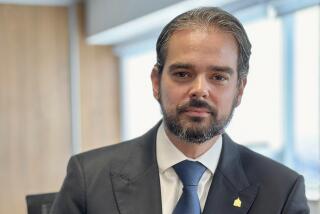A Life Devoted to the Victims, the Hungry and the Silenced
- Share via
BAGHDAD — Sergio Vieira de Mello, a veteran U.N. diplomat who tapped an easy charm and gentle mediating manner to steer strife-torn regions from Kosovo to East Timor away from bloodletting, died Tuesday in a terrorist bombing that also ravaged his final mission: the quest for a stable, peaceful and united Iraq. He was 55.
A suave Brazilian gone silver-haired amid the past decade’s conflicts, he was the concerned visage of a faceless institution, the sleeves-up, hands-on human rights commissioner in a world body often criticized for aloofness, bureaucracy and multilateral muddle.
As colleagues the world over mourned the loss of a man whose 34-year career read like a travelogue through the past generation’s most brutal landscapes, U.N. Secretary-General Kofi Annan described the slain envoy as an “outstanding servant of humanity.”
“The loss of Sergio Vieira de Mello is a bitter blow for the United Nations and for me personally,” Annan said in a statement. “I can think of no one we could less afford to spare.”
The killing of Vieira de Mello, the secretary-general’s special representative and the U.N.’s top diplomat here, leaves a hole in the effort to help Iraqis rebuild and reconcile. His calm, evenhanded interventions in volatile hotspots won respect for the United Nations and built a legacy that colleagues insist proves he did not die in vain.
Vieira de Mello “was the U.N., in a way,” said Salim Lone, his spokesman here. “Wherever there was suffering, he was there.”
He was also often there for the healing. His shepherding of East Timor from bloody ethnic chaos to joyous independence last year drew praise and admiration from a wide spectrum of political, ethnic and religious leaders.
East Timor President Jose Alexandre Gusmao said his country was shocked by the death of the man he called a “courageous friend and great leader.”
“Sergio Vieira de Mello endeared himself to the people of East Timor with his common touch, sensitivity, sense of humor and charisma,” Gusmao said. “As a leader he fought tirelessly for democracy, human rights and sustainable justice.”
Vieira de Mello’s criticism of U.S. detention of Sept. 11 terrorism suspects without trial established him in the eyes of many Muslims as a reliable advocate of fairness and justice. With his death, international forces working on Iraq’s troubled reconstruction may be deprived of a respected partner and savvy mediator.
In his last interview, Vieira de Mello commiserated with Iraqis upset by the occupation of their country. “It is traumatic. It must be one of the most humiliating periods in their history,” he told the Estado de Sao Paulo newspaper in his homeland in an article published Monday. “Who would like to see their country occupied? I wouldn’t like it if there were tanks driving down Copacabana.”
Gamal Ibrahim, until recently the head of Vieira de Mello’s protective detail here, had worked for the diplomat in East Timor as well. Always committed to the mission, Vieira de Mello had talked Ibrahim out of leaving his post in Dili by breaking out a bottle of rare whiskey.
When Ibrahim asked for two months off from his recent duties to rejoin his wife and baby son in the United States, the diplomat hinted at his own mixed feelings in sending him off to see his family.
“He told me: ‘If it were me, I would want to go too. So you go. I have to finish up here,’ ” Ibrahim recalled, shaken by the sudden need to use the past tense in speaking of his colleague.
He said Vieira de Mello respected the need for security but hated its constraints and the way the long protective motorcades made him appear like a viceroy. “He never thought that death would be that close to him.”
Ibrahim’s recollection of his boss’ conflicted emotions -- he said the envoy took the Iraq job out of loyalty to Annan -- reflected the diplomat’s awareness that unlike previous missions, the U.N. would be playing a supporting relief role rather than directing reconstruction and reconciliation efforts within the country.
State Department officials had privately expressed the hope that Vieira de Mello’s track record would allow Washington to mend fences with allies who opposed the war as well as put a cloak of international legitimacy on the occupation.
In a statement, Secretary of State Colin L. Powell said Tuesday: “My colleagues at the Department of State and I share the grief and sadness of the United Nations family, and of all those in the international community whose lives were enriched by Sergio Vieira de Mello.
“Sergio never shirked the most difficult assignments, including when U.N. Secretary-General Annan asked him to go to Iraq and take up this unprecedented mission as the secretary-general’s special representative. Those who worked closely with him over the long, hot weeks of this summer were struck by his sensible, pragmatic approach. Where others saw obstacles or despair, he created options and solutions.
“In my book, Mr. Vieira de Mello was a hero, who dedicated his life to helping people in danger and in difficulty. His loss is a terrible blow to the international community.”
Vieira de Mello was renowned for long days, tireless travel and indifference to hardship, often chafing under the excessive staffing for which U.N. operations are known.
It was probably his penchant for focusing on his work in peace and quiet that resulted in the fact that none of his 11-person protective detail was with him at the time of the blast. None was injured, although a secretary was reported killed.
Born March 15, 1948, in Rio de Janeiro, Vieira de Mello joined the United Nations in 1969 after studying at France’s prestigious Sorbonne University. Fluent in English, French and Spanish as well as his native Portuguese, he took his posts beyond cocktail-party diplomacy to set a standard for personal involvement in giving succor to the displaced, downtrodden and hungry.
The consummate diplomat, he was often teased by the politicians and journalists who followed him on his fact-finding visits to the world’s war zones for somehow managing to walk through oppressive heat and squalor without breaking a sweat or getting mud on his shoes.
Vieira de Mello began his career with the U.N. agency for refugees, tending to the displaced from Bangladesh to Mozambique, Cambodia to Croatia, Cyprus to Sudan.
He advised the U.N. Interim Force in Lebanon, served as the first postwar administrator in Kosovo in 1999, then took on his most ambitious assignment as the powerful transitional authority in East Timor during its three-year march from savage internecine warfare to independence.
While he was recognized in aid and international policy circles as an indefatigable human rights supporter, he took a more subtle approach to mediating conflicts, usually ushering his interlocutors out of the media spotlight to head off grandstanding.
Since replacing the outspoken Mary Robinson in the human rights role in September 2002, Vieira de Mello had taken a similarly critical but less strident position against the U.S. detention of terrorist suspects in Guantanamo Bay, Cuba.
At his first meeting with President Bush in March, he called the treatment of the Muslim detainees a “legal black hole” and admonished the president about abridging civil rights in the name of fighting terrorism.
Still, he may have been tainted in the eyes of extremists as he was quietly endorsed by the Bush administration as a preferable alternative to Robinson, who angered Washington with her campaign against the death penalty and her blaming the Israeli occupation for deadly clashes with Palestinians.
In an interview with Associated Press upon embarking on the human rights assignment, Vieira de Mello said he would neither pull his punches under pressure from powerful governments nor waver in the job’s fundamental responsibility to advocate for the world’s unfortunates.
“The job is about people. It is about the victims of conflict, about the hungry, the poor, those who live under oppressive regimes, the tortured and the silenced,” he said.
“Human rights are about dignity: the dignity of those denied their rights as well as our own dignity. And especially my own dignity, so that I can look at myself in the mirror and know that I am doing what they expect of me.”
He was an intensely private man who coveted his meager personal time. Little is known of his family life except that he is survived by two grown sons and a mother in Brazil.
Brazilian President Luiz Inacio Lula da Silva declared three days of official mourning.
*
Times staff writers Maggie Farley at the United Nations, T. Christian Miller in Venezuela, Richard C. Paddock in Jakarta, Indonesia, and Robin Wright in Washington contributed to this report.
More to Read
Sign up for Essential California
The most important California stories and recommendations in your inbox every morning.
You may occasionally receive promotional content from the Los Angeles Times.














